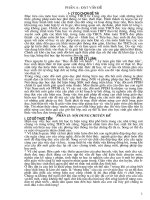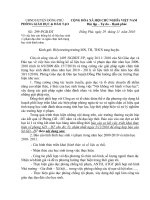Colonel quaritch v c
Bạn đang xem bản rút gọn của tài liệu. Xem và tải ngay bản đầy đủ của tài liệu tại đây (1.27 MB, 322 trang )
TheProjectGutenbergEBookofColonelQuaritch,V.C.,byH.Rider
Haggard
ThiseBookisfortheuseofanyoneanywhereatnocostandwithalmost
norestrictionswhatsoever.Youmaycopyit,giveitawayorre-use
itunderthetermsoftheProjectGutenbergLicenseincludedwiththis
eBookoronlineatwww.gutenberg.net
Title:ColonelQuaritch,V.C.,ATaleofCountryLife
Author:H.RiderHaggard
ReleaseDate:April3,2004[EBook#11882]
LastUpdated:October15,2018
Language:English
EtextproducedbyJohnBickersandDagny
HTMLfileproducedbyDavidWidger
***STARTOFTHISPROJECTGUTENBERGEBOOKCOLONELQUARITCH,V.C.***
COLONELQUARITCH,V.C.
ATaleOfCountryLife
ByH.RiderHaggard
FirstPublished1888.
IDEDICATE
THISTALEOFCOUNTRYLIFE
TO
MYFRIENDANDFELLOW-SPORTSMAN,
CHARLESJ.LONGMAN
PREPARER’SNOTE
Thistextwaspreparedfroman1889editionpublishedbyLongmans,Green
andCo.,printedbyKellyandCo.,GateStreet,Lincoln’sInnFields,W.C.;and
MiddleMill,Kingston-on-Thames.
CONTENTS
COLONELQUARITCH,V.C.
CHAPTERI.—HAROLDQUARITCHMEDITATES
CHAPTERII.—THECOLONELMEETSTHESQUIRE
CHAPTERIII.—THETALEOFSIRJAMESDELAMOLLE
CHAPTERIV.—THEENDOFTHETALE
CHAPTERV.—THESQUIREEXPLAINSTHEPOSITION
CHAPTERVI.—LAWYERQUEST
CHAPTERVII.—EDWARDCOSSEY,ESQUIRE
CHAPTERVIII.—MR.QUEST’SWIFE
CHAPTERIX.—THESHADOWOFRUIN
CHAPTERX.—THETENNISPARTY
CHAPTERXI.—IDA’SBARGAIN
CHAPTERXII.—GEORGEPROPHESIES
CHAPTERXIII.—ABOUTART
CHAPTERXIV.—THETIGERSHOWSHERCLAWS
CHAPTERXV.—THEHAPPYDAYS
CHAPTERXVI.—THEHOUSEWITHTHEREDPILLARS
CHAPTERXVII.—THETIGRESSINHERDEN
CHAPTERXVIII.—“WHATSOMEHAVEFOUNDSOSWEET”
CHAPTERXIX.—INPAWN
CHAPTERXX.—“GOOD-BYETOYOU,EDWARD”
CHAPTERXXI.—THECOLONELGOESOUTSHOOTING
CHAPTERXXII.—THEENDOFTHEMATCH
CHAPTERXXIII.—THEBLOWFALLS
CHAPTERXXIV.—“GOOD-BYE,MYDEAR,GOOD-BYE!”
CHAPTERXXV.—THESQUIREGIVESHISCONSENT
CHAPTERXXVI.—BELLEPAYSAVISIT
CHAPTERXXVII.—MR.QUESTHASHISINNINGS
CHAPTERXXVIII.—HOWGEORGETREATEDJOHNNIE
CHAPTER XXIX. — EDWARD COSSEY MEETS WITH AN
ACCIDENT
CHAPTERXXX.—HAROLDTAKESTHENEWS
CHAPTERXXXI.—IDARECANTS
CHAPTERXXXII.—GEORGEPROPHESIESAGAIN
CHAPTERXXXIII.—THESQUIRESPEAKSHISMIND
CHAPTERXXXIV.—GEORGE’SDIPLOMATICERRAND
CHAPTERXXXV.—THESWORDOFDAMOCLES
CHAPTERXXXVI.—HOWTHEGAMEENDED
CHAPTERXXXVII.—SISTERAGNES
CHAPTERXXXVIII.—COLONELQUARITCHEXPRESSESHIS
VIEWS
CHAPTERXXXIX.—THECOLONELGOESTOSLEEP
CHAPTERXL.—BUTNOTTOBED
CHAPTERXLI.—HOWTHENIGHTWENT
CHAPTERXLII.—IDAGOESTOMEETHERFATE
CHAPTERXLIII.—GEORGEISSEENTOLAUGH
CHAPTERXLIV.—CHRISTMASCHIMES
CONCLUSION
COLONELQUARITCH,V.C.
ATALEOFCOUNTRYLIFE
CHAPTERI.—HAROLDQUARITCH
MEDITATES
Therearethingsandtherearefaceswhich,whenfeltorseenforthefirsttime,
stampthemselvesuponthemindlikeasunimageonasensitizedplateandthere
remain unalterably fixed. To take the instance of a face—we may never see it
again,oritmaybecomethecompanionofourlife,buttherethepictureisjustas
we first knew it, the same smile or frown, the same look, unvarying and
unvariable, reminding us in the midst of change of the indestructible nature of
everyexperience,act,andaspectofourdays.Forthatwhichhasbeen,is,since
thepastknowsnocorruption,butliveseternallyinitsfrozenandcompletedself.
Thesearesomewhatlargethoughtstobebornofasmallmatter,buttheyrose
upspontaneouslyinthemindofasoldierly-lookingmanwho,ontheparticular
eveningwhenthishistoryopens,wasleaningoveragateinanEasterncounty
lane,staringvacantlyatafieldofripecorn.
Hewasapeculiarandratherbatteredlookingindividual,apparentlyoverforty
yearsofage,andyetbearinguponhimthatunmistakablestampofdignityand
self-respect which, if it does not exclusively belong to, is still one of the
distinguishingattributesoftheEnglishgentleman.Infacehewasugly,noother
word can express it. Here were not the long mustachios, the almond eyes, the
aristocraticairoftheColoneloffiction—forourdreamerwasaColonel.These
were—alas!thatthetruthshouldbesoplain—representedbysomewhatscrubby
sandy-colouredwhiskers,smallbutkindlyblueeyes,alowbroadforehead,with
a deep line running across it from side to side, something like that to be seen
upon the busts of Julius Caesar, and a long thin nose. One good feature,
however, he did possess, a mouth of such sweetness and beauty that set, as it
was, above a very square and manly-looking chin, it had the air of being
ludicrouslyoutofplace.“Umph,”saidhisoldaunt,Mrs.Massey(whohadjust
diedandlefthimwhatshepossessed),ontheoccasionofherfirstintroductionto
himfive-and-thirtyyearsbefore,“Umph!Naturemeanttomakeaprettygirlof
you,andchangedhermindaftershehadfinishedthemouth.Well,nevermind,
betterbeaplainmanthanaprettywoman.There,goalong,boy!Ilikeyourugly
face.”
Norwastheoldladypeculiarinthisrespect,forplainasthecountenanceof
ColonelHaroldQuaritchundoubtedlywas,peoplefoundsomethingverytaking
aboutit,whenoncetheybecameaccustomedtoitsruggedairandsternregulated
expression.Whatthatsomethingwasitwouldbehardtodefine,butperhapsthe
nearestapproachtothetruthwouldbetodescribeitasalightofpuritywhich,
notwithstanding the popular idea to the contrary, is quite as often to be found
upon the faces of men as upon those of women. Any person of discernment
lookingonColonelQuaritchmusthavefeltthathewasinthepresenceofagood
man—notaprigoramilksop,butamanwhohadattainedbyvirtueofthought
and struggle that had left their marks upon him, a man whom it would not be
welltotamperwith,onetoberespectedbyall,andfearedofevildoers.Menfelt
this,andhewaspopularamongthosewhoknewhiminhisservice,thoughnot
inanyhail-fellow-well-metkindofway.Butamongwomenhewasnotpopular.
As a rule they both feared and disliked him. His presence jarred upon the
frivolityofthelightermembersoftheirsex,whodimlyrealisedthathisnature
wasantagonistic,andthemoresolidonescouldnotunderstandhim.Perhapsthis
wasthereasonwhyColonelQuaritchhadnevermarried,hadneverevenhada
loveaffairsincehewasfive-and-twenty.
Andyetitwasofawomanthathewasthinkingasheleantoverthegate,and
looked at the field of yellowing corn, undulating like a golden sea beneath the
pressureofthewind.
ColonelQuaritchhadtwicebeforebeenatHonham,onceten,andoncefour
yearsago.Nowhewascometoabidethereforgood.Hisoldaunt,Mrs.Massey,
hadownedaplaceinthevillage—averysmallplace—calledHonhamCottage,
or Molehill,andon thosetwooccasions he visitedher.Mrs. Masseywasdead
and buried. She had left him the property, and with some reluctance, he had
givenuphisprofession,inwhichhesawnofurtherprospects,andcometolive
upon it. This was his first evening in the place, for he had arrived by the last
trainonthepreviousnight.Alldayhehadbeenbusytryingtogetthehousea
little straight, and now, thoroughly tired, he was refreshing himself by leaning
overagate.Itis,thoughagreatmanypeoplewillnotbelieveit,oneofthemost
delightfulandcertainlyoneofthecheapestrefreshmentsintheworld.
Andthenitwas,asheleantoverthegate,thattheimageofawoman’sface
rosebeforehismindasithadcontinuallyrisenduringthelastfiveyears.Five
yearshadgonesincehesawit,andthosefiveyearshespentinIndiaandEgypt,
thatiswiththeexceptionofsixmonthswhichhepassedinhospital—theupshot
ofanArabspearthrustinthethigh.
It had risen before him in all sorts of places and at all sorts of times; in his
sleep, in his waking moments, at mess, out shooting, and even once in the hot
rushofbattle.Heremembereditwell—itwasatElTeb.Ithappenedthatstern
necessityforcedhimtoshootamanwithhispistol.Thebulletcutthroughhis
enemy,andwithafewconvulsionshedied.Hewatchedhimdie,hecouldnot
helpdoingso,therewassomefascinationinfollowingtheactofhisownhandto
its dreadful conclusion, and indeed conclusion and commencement were very
neartogether.Theterrorofthesight,theterrorofwhatindefenceofhisownlife
hewasforcedtodo,revoltedhimevenintheheatofthefight,andeventhen,
over that ghastly and distorted face, another face spread itself like a mask,
blotting it out from view—that woman’s face. And now again it re-arose,
inspiring him with the rather recondite reflections as to the immutability of
thingsandimpressionswithwhichthisdomesticrecordopens.
Five years is a good stretch in a man’s journey through the world. Many
things happen to us in that time. If a thoughtful person were to set to work to
recordalltheimpressionswhichimpingeuponhismindduringthatperiod,he
would fill a library with volumes, the mere tale of its events would furnish a
shelf.Andyethowsmalltheyaretolookbackupon.Itseemedbuttheotherday
that he was leaning over this very gate, and had turned to see a young girl
dressed in black, who, with a spray of honeysuckle thrust in her girdle, and
carryingastickinherhand,waswalkingleisurelydownthelane.
Therewassomethingaboutthegirl’sairthathadstruckhimwhileshewasyet
alongwayoff—adignity,agrace,andasetoftheshoulders.Thenasshecame
nearer he saw the soft dark eyes and the waving brown hair that contrasted so
strangely and effectively with the pale and striking features. It was not a
beautifulface,forthemouthwastoolarge,andthenosewasnotasstraightasit
mighthavebeen,buttherewasapoweraboutthebroadbrow,andaforceand
solidnobilitystampeduponthefeatureswhichhadimpressedhimstrangely.Just
asshecameoppositetowherehewasstanding,agustofwind,fortherewasa
stiffbreeze,blewthelady’shatoff,takingitoverthehedge,andhe,asinduty
bound,scrambledintothefieldandfetcheditforher,andshehadthankedhim
withaquicksmileandalightingupofthebrowneyes,andthenpassedonwith
abow.
Yes,withalittlebowshehadpassedon,andhewatchedherwalkingdown
thelong leveldrift, tillher imagemeltedintothestormy sunsetlight,andwas
gone.Whenhereturnedtothecottagehehaddescribedhertohisoldaunt,and
askedwhoshemightbe,tolearnthatshewasIdadelaMolle(whichsounded
like a name out of a novel), the only daughter of the old squire who lived at
Honham Castle. Next day he had left for India, and saw Miss de la Molle no
more.
Andnowhewonderedwhathadbecomeofher.Probablyshewasmarried;so
strikingapersonwouldbealmostsuretoattractthenoticeofmen.Andafterall
whatcoulditmattertohim?Hewasnotamarryingman,andwomenasaclass
hadlittleattractionforhim;indeedhedislikedthem.Ithasbeensaidthathehad
never married, and never even had a love affair since he was five-and-twenty.
Butthoughhewasnotmarried,heonce—beforehewasfive-and-twenty—very
nearlytookthatstep.Itwastwentyyearsagonow,andnobodyquiteknewthe
history,forintwentyyearsmanythingsarefortunatelyforgotten.Buttherewas
a history, and a scandal, and the marriage was broken off almost on the day it
shouldhavetakenplace.Andafterthatitleakedoutintheneighbourhoodthat
the young lady, who by the way was a considerable heiress, had gone off her
head, presumably with grief, and been confined in an asylum, where she was
believedstilltoremain.
Perhapsitwasthethoughtofthisonewoman’sface,thewomanhehadonce
seenwalkingdownthedrift,herfigurelimnedoutagainstthestormysky,that
ledhimtothinkoftheotherface,thefacehiddeninthemadhouse.Atanyrate,
withasigh,orratheragroan,heswunghimselfroundfromthegateandbegan
towalkhomewardatabriskpace.
Thedriftthathewasfollowingisknownasthemiledrift,andhadinancient
timesformedtheapproachtothegatesofHonhamCastle,theseatoftheancient
andhonourablefamilyofdelaMolle(sometimeswritten“Delamol”inhistory
and old writings). Honham Castle was now nothing but a ruin, with a manor
housebuiltoutofthewreckononesideofitssquare,andthebroadwaythatled
toitfromthehighroadwhichranfromBoisingham,[*]thelocalcountrytown,
wasadriftorgrasslane.
[*]SaidtohavebeensonamedaftertheBoisseyfamily,
whoseheiressadelaMollemarriedinthefourteenth
century.As,however,thetownofBoisinghamismentionedby
oneoftheoldchroniclers,thisdoesnotseemvery
probable.Nodoubtthefamilytooktheirnamefromthetown
orhamlet,notthetownfromthefamily.
Colonel Quaritch followed this drift till he came to the high road, and then
turned.Afewminutes’walkbroughthimtoadriveopeningoutofthemainroad
onthe leftashefacedtowards Boisingham.Thisdrive,whichwassomethree
hundred yards long, led up a rather sharp slope to his own place, Honham
Cottage, or Molehill, as the villagers called it, a title calculated to give a keen
impression of a neat spick and span red brick villa with a slate roof. In fact,
however,itwasnothingofthesort,beingabuildingofthefifteenthcentury,asa
glanceatitsmassiveflintwallswassufficienttoshow.Inancienttimestherehad
been a large Abbey at Boisingham, two miles away, which, the records tell,
suffered terribly from an outbreak of the plague in the fifteenth century. After
thisthemonksobtainedtenacresofland,knownasMolehill,bygrantfromthe
delaMolleoftheday,andsonamedeitheronaccountoftheirresemblancetoa
molehill (of which more presently) or after the family. On this elevated spot,
which was supposed to be peculiarly healthy, they built the little house now
calledHonhamCottage,wheretotoflywhennexttheplagueshouldvisitthem.
Andastheybuiltit,so,withsomeslightadditions,ithadremainedtothisday,
for in those ages men did not skimp their flint, and oak, and mortar. It was a
beautifullittlespot,situatedupontheflattopofaswellinghill,whichcomprised
thetenacresofgrazinggroundoriginallygranted,andwas,strangetosay,still
themostmagnificently-timberedpieceofgroundinthecountryside.Foronthe
tenacresofgrasslandtherestoodoverfiftygreatoaks,someofthempollardsof
themostenormousantiquity,andotherswhichhad,nodoubt,originallygrown
very close together, fine upstanding trees with a wonderful length and girth of
bole. This place, Colonel Quaritch’s aunt, old Mrs. Massey, had bought nearly
thirtyyearsbeforewhenshebecameawidow,andnow,togetherwithamodest
incomeoftwohundredayear,ithadpassedtohimunderherwill.
Shakinghimselfclearofhissadthoughts,HaroldQuaritchturnedroundathis
ownfrontdoortocontemplatethescene.Thelong,single-storiedhousestood,it
has been said, at the top of the rising land, and to the south and west and east
commandedasbeautifulaviewasistobeseeninthecounty.There,amileorso
awaytothesouth,situatedinthemidstofgrassygrazinggrounds,andflanked
on either side by still perfect towers, frowned the massive gateway of the old
Norman castle. Then, to the west, almost at the foot of Molehill, the ground
brokeawayinadeepbankclothedwithtimber,whichledtheeyedownbyslow
descents into the beautiful valley of the Ell. Here the silver river wound its
gentle way through lush and poplar-bordered marshes, where the cattle stand
knee-deepinflowers;pastquaintwoodenmill-houses,throughBoisinghamOld
Common,windylookingevennow,andbrightenedhereandtherewithadashof
goldengorse,tillitwaslostbeneaththepicturesqueclusterofred-tiledroofsthat
markedtheancienttown.Lookwhichwayhewould,theviewwaslovely,and
equal to any to be found in the Eastern counties, where the scenery is fine
enough in its own way, whatever people may choose to say to the contrary,
whose imaginations are so weak that they require a mountain and a torrent to
excitethemintoactivity.
Behindthehousetothenorththerewasnoview,andforagoodreason,for
here in the very middle of the back garden rose a mound of large size and
curious shape, which completely shut out the landscape. What this mound,
whichmayperhapshavecoveredhalfanacreofground,was,nobodyhadany
idea.SomelearnedfolkwriteitdownaSaxontumulus,apresumptiontowhich
its ancient name, “Dead Man’s Mount,” seemed to give colour. Other folk,
however, yet more learned, declared it to be an ancient British dwelling, and
pointedtriumphantlytoahollowatthetop,whereintheancientBritisherswere
supposed to have moved, lived, and had their being—which must, urged the
opposingparty,havebeenaverydampone.ThereonthelateMrs.Massey,who
wasaBritishdwellingite,proceededtoshowwithmuchtriumphhowtheyhad
livedintheholebybuildingahugemushroom-shapedroofoverit,andthereby
turning it into a summer-house, which, owing to unexpected difficulties in the
constructionoftheroof,costagreatdealofmoney.Butastheroofwasslated,
andasitwasfoundnecessarytopavethehollowwithtilesandcutsurfacedrains
init,theresultdidnotclearlyproveitsuseasadwellingplacebeforetheRoman
conquest.Nordiditmakeaverygoodsummerhouse.Indeeditnowservedasa
storeplaceforthegardener’stoolsandforrubbishgenerally.
CHAPTERII.—THECOLONELMEETSTHE
SQUIRE
As Colonel Quaritch was contemplating these various views and reflecting
thatonthewholehehaddonewelltocomeandliveatHonhamCottage,hewas
suddenlystartledbyaloudvoicesalutinghimfromabouttwentyyardsdistance
withsuchpeculiarvigourthathefairlyjumped.
“Colonel Quaritch, I believe,” said, or rather shouted, the voice from
somewheredownthedrive.
“Yes,”answeredtheColonelmildly,“hereIam.”
“Ah,Ithoughtitwasyou.Alwaystellamilitaryman,youknow.Excuseme,
butIamrestingforaminute,thislastpullisanuncommonlystiffone.Ialways
usedtotellmydearoldfriend,Mrs.Massey,thatsheoughttohavethehillcut
away a bit just here. Well, here goes for it,” and after a few heavy steps his
visitor emerged from the shadow of the trees into the sunset light which was
playingontheterracebeforethehouse.
ColonelQuaritchglancedupcuriouslytoseewhotheownerofthegreatvoice
mightbe,andhiseyeslituponasfineaspecimenofhumanityashehadseenfor
alongwhile.Themanwasold,ashiswhitehairshowed,seventyperhaps,but
that was the only sign of decay about him. He was a splendid man, broad and
thickandstrong,withakeen,quickeye,andafacesharplychiselled,andclean
shaved,ofthestampwhichinnovelsisgenerallyknownasaristocratic,aface,
infact,thatshowedbothbirthandbreeding.Indeed,asclothedinloosetweed
garmentsandagiganticpairoftopboots,hisvisitorstoodleaningonhislong
stick and resting himself after facing the hill, Harold Quaritch thought that he
had never seen a more perfect specimen of the typical English country
gentleman—astheEnglishcountrygentlemanusedtobe.
“How do you do, sir, how do you do—my name is de la Molle. My man
George,whoknowseverybody’sbusinessexcepthisown,toldmethatyouhad
arrived here, so I thought I would walk round and do myself the honour of
makingyouracquaintance.”
“Thatisverykindofyou,”saidtheColonel.
“Notatall.Ifyouonlyknewhowuncommonlydullitisdownintheseparts
you would not say that. The place isn’t what it used to be when I was a boy.
Thereareplentyofrichpeopleabout,buttheyarenotthesamestampofpeople.
It isn’t what it used to be in more ways than one,” and the old Squire gave
something like a sigh, and thoughtfully removed his white hat, out of which a
dinnernapkinandtwopocket-handkerchiefsfelltotheground,inafashionthat
remindedColonelQuaritchoftheclimaxofaconjuringtrick.
“You have dropped some—some linen,” he said, stooping down to pick the
mysteriousarticlesup.
“Oh,yes,thankyou,”answeredhisvisitor,“Ifindthesunalittlehotatthis
timeoftheyear.Thereisnothinglikeafewhandkerchiefsoratoweltokeepit
off,”andherolledthemassofnaperyintoaball,andcrammingitbackintothe
crown,replacedthehatonhisheadinsuchafashionthatabouteightinchesof
whitenapkinhungdownbehind.“YoumusthavefeltitinEgypt,”hewenton
—“the sun I mean. It’s a bad climate, that Egypt, as I have good reason to
know,” and he pointed again to his white hat, which Harold Quaritch now
observedforthefirsttimewasencircledbyabroadblackband.
“Ah,Isee,”hesaid,“Isupposethatyouhavehadaloss.”
“Yes,sir,averyheavyloss.”
Now Colonel Quaritch had never heard that Mr. de la Molle had more than
onechild,IdadelaMolle,theyoungladywhosefaceremainedsostronglyfixed
inhismemory,althoughhehadscarcelyspokentoheronthatoneoccasionfive
longyearsago.CoulditbepossiblethatshehaddiedinEgypt?Theideasenta
tremor of fear through him, though of course there was no real reason why it
should.Deathsaresocommon.
“Not—notMissdelaMolle?”hesaidnervously,adding,“Ihadthepleasure
ofseeingheronce,agoodmanyyearsago,whenIwasstoppinghereforafew
dayswithmyaunt.”
“Oh,no,notIda,sheisaliveandwell,thankGod.HerbrotherJames.Hewent
allthroughthatwretchedwarwhichweowetoMr.Gladstone,asIsay,thoughI
don’t know what your politics are, and then caught a fever, or as I think got
touchedbythesun,anddiedonhiswayhome.Poorboy!Hewasafinefellow,
ColonelQuaritch,andmyonlyson,butveryreckless.Onlyamonthorsobefore
hedied,Iwrotetohimtobecarefulalwaystoputatowelinhishelmet,andhe
answered, in that flippant sort of way he had, that he was not going to turn
himselfintoadirtyclothesbag,andthatheratherlikedtheheatthanotherwise.
Well, he’s gone, poor fellow, in the service of his country, like many of his
ancestorsbeforehim,andthere’sanendofhim.”
Andagaintheoldmansighed,heavilythistime.
“Andnow,ColonelQuaritch,”hewenton,shakingoffhisoppressionwitha
curiousrapiditythatwascharacteristicofhim,“whatdoyousaytocomingupto
the Castle for your dinner? You must be in a mess here, and I expect that old
Mrs.Jobson,whommymanGeorgetellsmeyouhavegottolookafteryou,will
begladenoughtoberidofyouforto-night.Whatdoyousay?—taketheplace
asyoufindit,youknow.Ibelievethatthereisalegofmuttonfordinnerifthere
isnothingelse,becauseinsteadofmindinghisownbusinessIsawGeorgegoing
offtoBoisinghamtofetchitthismorning.Atleast,thatiswhathesaidhewas
goingfor;justanexcusetogossipandidle,Ifancy.”
“Well,really,”saidtheColonel,“youareverykind;butIdon’tthinkthatmy
dressclothesareunpackedyet.”
“Dress clothes! Oh, never mind your dress clothes. Ida will excuse you, I
daresay.Besides,youhavenotimetodress.ByJove,it’snearlyseveno’clock;
wemustbeoffifyouarecoming.”
The Colonel hesitated. He had intended to dine at home, and being a
methodical-mindedmandidnotlikealteringhisplans.Also,hewas,likemost
military men, very punctilious about his dress and personal appearance, and
objectedtogoingouttodinnerinashootingcoat.Butallthisnotwithstanding,a
feelingthathedidnotquiteunderstand,andwhichitwouldhavepuzzledeven
anAmericannovelisttoanalyse—somethingbetweenrestlessnessandcuriosity,
withadashofmagneticattractionthrownin—gotthebetterofhisscruples,and
heaccepted.
“Well, thank you,” he said, “if you are sure that Miss de la Molle will not
mind,Iwillcome.JustallowmetotellMrs.Jobson.”
“That’sright,”halloaedtheSquireafterhim,“I’llmeetyouatthebackofthe
house.Wehadbettergothroughthefields.”
BythetimethattheColonel,havinginformedhishousekeeperthatheshould
notwantanydinner,andhastilybrushedhisnottooluxuriantlocks,hadreached
the garden which lay behind the house, the Squire was nowhere to be seen.
Presently,however,aloudhalloafromthetopofthetumulus-likehillannounced
hiswhereabouts.
Wondering what the old gentleman could be doing there, Harold Quaritch
walkedupthestepsthatledtothesummitofthemound,andfoundhimstanding
attheentrancetothemushroom-shapedsummer-house,contemplatingtheview.
“There,Colonel,”hesaid,“there’saperfectviewforyou.TalkaboutScotland
andtheAlps!GivemeaviewofthevalleyofEllfromthetopofDeadMan’s
Mount on an autumn evening, and I never want to see anything finer. I have
always loved it from a boy, and always shall so long as I live—look at those
oaks, too. There are no such trees in the county that I know of. The old lady,
your aunt, was wonderfully fond of them. I hope—” he went on in a tone of
anxiety—“Ihopethatyoudon’tmeantocutanyofthemdown.”
“Ohno,”saidtheColonel,“Ishouldneverthinkofsuchathing.”
“That’sright.Nevercutdownagoodtreeifyoucanhelpit.I’msorrytosay,
however,”headdedafterapause,“thatIhavebeenforcedtocutdownagood
manymyself.Queerplacethis,isn’tit?”hecontinued,dropping thesubjectof
thetrees,whichwasevidentlyapainfulonetohim.“DeadMan’sMountiswhat
the people about here call it, and that is what they called it at the time of the
Conquest,asIcanprovetoyoufromancientwritings.Ialwaysbelievedthatit
was a tumulus, but of late years a lot of these clever people have been taking
theiroaththatitisanancientBritishdwelling,asthoughAncientBritons,orany
oneelseforthatmatter,couldliveinakindofdrainhole.Buttheygotonthesoft
side of your old aunt—who, by the way, begging your pardon, was a
wonderfullyobstinateoldladywhenonceshehammeredanideaintoherhead—
andsoshesettoworkandbuiltthisslatemushroomovertheplace,andoneway
and another it cost her two hundred and fifty pounds. Dear me! I shall never
forget her face when she saw the bill,” and the old gentleman burst out into a
Titaniclaugh,suchasHaroldQuaritchhadnotheardformanyalongday.
“Yes,”heanswered,“itisaqueerspot.IthinkthatImusthaveadigatitone
day.”
“ByJove,”saidtheSquire,“Ineverthoughtofthat.Itwouldbeworthdoing.
Hulloa,itistwentyminutespastseven,andwedineathalfpast.Ishallcatchit
from Ida. Come on, Colonel Quaritch; you don’t know what it is to have a
daughter—adaughterwhenoneislatefordinnerisaseriousthingforanyman,”
andhestartedoffdownthehillinahurry.
Very soon, however, he seemed to forget the terrors in store, and strolled
along,stoppingnowandagaintoadmiresomeparticularoakorview;chatting
allthewhileinadiscursivemanner,which,thoughsomewhataimless,wasbyno
means without its charm. He made a capital companion for a silent man like
HaroldQuaritchwholikedtohearotherpeopletalk.
Inthiswaytheywentdowntheslope,andcrossingacoupleofwheatfields
cametoasuccessionofbroadmeadows,somewhatsparselytimbered.Through
thesethefootpathranrightuptothegrimgatewayoftheancientCastle,which
now loomed before them, outlined in red lines of fire against the ruddy
backgroundofthesunsetsky.
“Ay, it’s a fine old place, Colonel, isn’t it?” said the Squire, catching the
exclamationofadmirationthatbrokefromhiscompanion’slips,asasuddenturn
broughtthemintolinewiththeNormanruin.“History—that’swhatitis;history
in stone and mortar; this is historic ground, every inch of it. Those old de la
Molles,myancestors,andtheBoisseysbeforethem,weregreatfolkintheirday,
and they kept up their position well. I will take you to see their tombs in the
churchyonderonSunday.Ialwayshopedtobeburiedbesidethem,butIcan’t
manageitnow,becauseoftheAct.However,ImeantogetasneartothemasI
can.IhaveafancyforthecompanionshipofthoseoldBarons,thoughIexpect
thattheywerearoughishlotintheirlifetimes.Lookhowsquarelythosetowers
standoutagainstthesky.Theyalwaysremindmeofthemenwhobuiltthem—
sturdy, overbearing fellows, setting their shoulders against the sea of
circumstance and caring neither for man nor devil till the priests got hold of
them at the last. Well, God rest them, they helped to make England, whatever
theirfaults.Queerplacetochooseforacastle,though,wasn’tit?rightoutinan
openplain.”
“I suppose that they trusted to their moat and walls, and the hagger at the
bottomofthedryditch,”saidtheColonel.“Youseethereisnoeminencefrom
which they could be commanded, and their archers could sweep all the plain
fromthebattlements.”
“Ah, yes,of course theycould.Itiseasytoseethatyouareasoldier.They
werenofools,thoseoldcrusaders.Myword,wemustbegettingon.Theyare
haulingdowntheUnionJackonthewesttower.Ialwayshaveithauleddownat
sunset,”andhebeganwalkingbrisklyagain.
Inanotherthreeminutestheyhadcrossedanarrowby-road,andwerepassing
uptheancientdrivethatledtotheCastlegates.Itwasnotmuchofadrive,but
therewerestillsomehalf-dozenofoldpollardoaksthathadnodoubtstoodthere
beforetheNormanBoissey,fromwhosefamily,centuriesago,thedelaMolles
hadobtainedthepropertybymarriagewiththeheiress,hadgothischarterand
cutthefirstsodofhismoat.
RightbeforethemwasthegatewayoftheCastle,flankedbytwogreattowers,
and these, with the exception of some ruins were, as a matter of fact, all that
remainedoftheancientbuilding,whichhadbeeneffectuallydemolishedinthe
timeofCromwell.Thespacewithin,wherethekeephadoncestood,wasnow
laid out as a flower garden, while the house, which was of an unpretentious
nature,andbuiltintheJacobeanstyle,occupiedthesouthsideofthesquare,and
wasplacedwithitsbacktothemoat.
“YouseeIhavepracticallyrebuiltthosetwotowers,”saidtheSquire,pausing
underneaththeNormanarchway.“IfIhadnotdoneit,”headdedapologetically,
“theywouldhavebeeninruinsbynow,butitcostaprettypenny,Icantellyou.
Nobody knows what stuff that old flint masonry is to deal with, till he tries it.
Well, they will stand now for many a long day. And here we are”—and he
pushedopenaporchdoorandthenpassedupsomestepsandthroughapassage
into an oak-panelled vestibule, which was hung with tapestry originally taken,
nodoubt,fromtheoldCastle,anddecoratedwithcoatsofarmour,spearheads,
andancientswords.
And here it was that Harold Quaritch once more beheld the face which had
hauntedhismemoryforsomanymonths.
CHAPTERIII.—THETALEOFSIRJAMESDE
LAMOLLE
“Isthatyou,father?”said a voice,averysweetvoice,butoneofwhichthe
tones betrayed the irritation natural to a healthy woman who has been kept
waitingforherdinner.Thevoicecamefromtherecessesoftheduskyroomin
which the evening gloom had gathered deeply, and looking in its direction,
Harold Quaritchcouldseetheoutline ofatallformsittinginanoldoakchair
withitshandscrossed.
“Is that you, father? Really it is too bad to be so late for dinner—especially
afteryoublewupthatwretchedEmmalastnightbecauseshewasfiveminutes
aftertime.IhavebeenwaitingsolongthatIhavealmostbeenasleep.”
“Iamverysorry,mydear,very,”saidtheoldgentlemanapologetically,“but—
hullo!I’veknockedmyhead—here,Mary,bringmealight!”
“Hereisalight,”saidthevoice,andatthesamemomenttherewasasoundof
amatchbeingstruck.
In another moment the candle was burning, and the owner of the voice had
turned,holdingitinsuchafashionthatitsrayssurroundedherlikeanaureole—
showing Harold Quaritch that face of which the memory had never left him.
Therewerethesamepowerfulbroadbrow,thesamenobilityoflook,thesame
browneyesandsoftwavinghair.Butthegirlhoodhadgoneoutofthem,theface
wasnowthefaceofawomanwhoknewwhatlifemeant,andhadnotfoundit
tooeasy.Ithadlostsomeofitsdreaminess,hethought,thoughithadgainedin
intellectualforce.Asforthefigure,itwasmuchmoreadmirablethantheface,
which was strictly speaking not a beautiful one. The figure, however, was
undoubtedlybeautiful,indeed,itisdoubtfulifmanywomencouldshowafiner.
IdadelaMollewasalarge,strongwoman,andtherewasaboutheraswingand
a lissom grace which is very rare, and as attractive as it is rare. She was now
nearly six-and-twenty years of age, and not having begun to wither in
accordancewiththefatewhichovertakesallunmarriedwomenafterthirty,was
atherverybest.HaroldQuaritch,glancingatherwell-poisedhead,herperfect
neckandarms(forshewasineveningdress)andhergraciousform,thoughtto
himselfthathehadneverseenanobler-lookingwoman.
“Why,mydearfather,”shewentonasshewatchedthecandleburnup,“you
made such a fuss this morning about the dinner being punctually at half-past
seven,andnowitiseighto’clockandyouarenotdressed.Itisenoughtoruin
any cook,” and she broke off for the first time, seeing that her father was not
alone.
“Yes,mydear,yes,”saidtheoldgentleman,“IdaresayIdid.Itishumanto
err, my dear, especially about dinner on a fine evening. Besides, I have made
amendsandbroughtyouavisitor,ournewneighbour,ColonelQuaritch.Colonel
Quaritch,letmeintroduceyoutomydaughter,MissdelaMolle.”
“I think that we have met before,” said Harold, in a somewhat nervous
fashion,ashestretchedouthishand.
“Yes,”answeredIda,takingit,“Iremember.Itwasinthelongdrift,fiveyears
ago,onawindyafternoon,whenmyhatblewoverthehedgeandyouwentto
fetchit.”
“You have a good memory, Miss de la Molle,” said he, feeling not a little
pleasedthatsheshouldhaverecollectedtheincident.
“Evidently not better than your own, Colonel Quaritch,” was the ready
answer. “Besides, one sees so few strangers here that one naturally remembers
them.Itisaplacewherenothinghappens—timepasses,thatisall.”
Meanwhile the old Squire, who had been making a prodigious fuss with his
hatandstick,whichhemanagedtosendclatteringdowntheflightofstonesteps,
departedtogetready,sayinginakindofroarashewentthatIdawastoorderin
thedinner,ashewouldbedowninaminute.
Accordinglysherangthebell,andtoldthemaidtobringinthesoupinfive
minutesandtolayanotherplace.ThenturningtoHaroldshebegantoapologise
tohim.
“Idon’tknowwhatsortofdinneryouwillget,ColonelQuaritch,”shesaid;
“itissoprovokingofmyfather;henevergivesonetheleastwarningwhenheis
goingtoaskanyonetodinner.”
“Notatall—notatall,”heansweredhurriedly.“ItisIwhooughttoapologise,
comingdownonyoulike—like——”
“Awolfonthefold,”suggestedIda.
“Yes,exactly,”hewentonearnestly,lookingathiscoat,“butnotinpurpleand
gold.”
“Well,”shewentonlaughing,“youwillgetverylittletoeatforyourpains,
andIknowthatsoldiersalwayslikegooddinners.”
“Howdoyouknowthat,MissdelaMolle?”
“Oh,becauseofpoorJamesandhisfriendswhomheusedtobringhere.By
theway, Colonel Quaritch,”shewent onwith asuddensofteningof thevoice,
“youhavebeeninEgypt,Iknow,becauseIhavesooftenseenyournameinthe
papers;didyouevermeetmybrotherthere?”
“Iknewhimslightly,”heanswered.“Onlyveryslightly.Ididnotknowthat
hewasyourbrother,orindeedthatyouhadabrother.Hewasadashingofficer.”
Whathedidnotsay,however,wasthathealsoknewhimtohavebeenoneof
thewildestandmostextravagantyoungmeninanextravagantregiment,andas
such had to some extent shunned his society on the few occasions that he had
beenthrowninwithhim.PerhapsIda,withawoman’squickness,divinedfrom
histonethattherewassomethingbehindhisremark—atanyrateshedidnotask
himforparticularsoftheirslightacquaintance.
“Hewasmyonlybrother,”shecontinued;“thereneverwerebutwetwo,and
of course his loss was a great blow to me. My father cannot get over it at all,
although——”andshebrokeoffsuddenly,andrestedherheaduponherhand.
AtthismomenttheSquirewasheardadvancingdownthestairs,shoutingto
theservantsashecame.
“Athousandpardons,mydear,athousandpardons,”hesaidasheenteredthe
room,“but,well,ifyouwillforgiveparticulars,Iwasquiteunabletodiscover
thewhereaboutsofacertainnecessaryportionofthemaleattire.Now,Colonel
Quaritch,willyoutakemydaughter?Stop,youdon’tknowtheway—perhapsI
hadbettershowyouwiththecandle.”
Accordinglyheadvancedoutofthevestibule,andturningtotheleft,ledthe
way down a long passage till he reached the dining-room. This apartment was
like the vestibule, oak-panelled, but the walls were decorated with family and
other portraits, including a very curious painting of the Castle itself, as it was
beforeitsdestructioninthetimeofCromwell.Thispaintingwasexecutedona
massive slab of oak, and conceived in a most quaint and formal style, being
relieved in the foreground with stags at gaze and woodeny horses, that must,
accordingtoanyruleofproportion,havebeenabouthalfaslargeasthegateway
towers.Evidently,also,itwasofanolderdatethanthepresenthouse,whichis
Jacobean,havingprobablybeenremovedtoitspresentpositionfromtheruinsof
theCastle.Suchasitwas,however,itgaveaverygoodideaofwhattheancient
seatoftheBoisseysanddelaMolleshadbeenlikebeforetheRoundheadshad
made an end of its glory. The dining-room itself was commodious, though not
large.Itwaslightedbythreenarrowwindowswhichlookedoutuponthemoat,
and bore a considerable air of solid comfort. The table, made of black oak, of
extraordinary solidity and weight, was matched by a sideboard of the same
materialandapparentlyofthesamedate,bothpiecesoffurniturebeing,asMr.
delaMolleinformedhisguests,relicsoftheCastle.
Onthissideboardwereplacedseveralpiecesofoldandmassiveplate,eachof
which was rudely engraved with three falcons or, the arms of the de la Molle
family.Onepiece,indeed,averyancientsalver,borethoseoftheBoisseys—a
ragged oak, in an escutcheon of pretence—showing thereby that it dated from
thatdelaMollewhointhetimeofHenrytheSeventhhadobtainedtheproperty
bymarriagewiththeBoisseyheiress.
Conversationhavingturnedthatway,asthedinner,whichwasasimpleone,
went on, the old Squire had this piece of plate brought to Harold Quaritch for
himtoexamine.
“Itisverycurious,”hesaid;“haveyoumuchofthis,Mr.delaMolle?”
“Noindeed,”hesaid;“IwishIhad.ItallvanishedinthetimeofCharlesthe
First.”
“Melteddown,Isuppose,”saidtheColonel.
“No,thatistheoddpartofit.Idon’tthinkitwas.Itwashiddensomewhere—
Idon’tknowwhere,orperhapsitwasturnedintomoneyandthemoneyhidden.
ButIwilltellyouthestoryifyoulikeassoonaswehavedonedinner.”
Accordingly, when the servants had removed the cloth, and after the old
fashion placed the wine upon the naked wood, the Squire began his tale, of
whichthefollowingisthesubstance.
“In the time of James I. the de la Molle family was at the height of its
prosperity, that is, so far as money goes. For several generations previous the
representatives of the family had withdrawn themselves from any active
participationinpublicaffairs,andlivinghereatsmallexpenseupontheirlands,
whichwereatthattimeverylarge,hadamassedaquantityofwealththat,forthe
age, might fairly be called enormous. Thus, Sir Stephen de la Molle, the
grandfather of the Sir James who lived in the time of James I., left to his son,
also named Stephen, a sum of no less than twenty-three thousand pounds in
gold.ThisStephenwasagreatmiser,andtraditionsaysthathetrebledthesum
in his lifetime. Anyhow, he died rich as Croesus, and abominated alike by his
tenantsandbythecountryside,asmightbeexpectedwhenagentlemanofhis
race and fame degraded himself, as this Sir Stephen undoubtedly did, to the
practiceofusury.
“With the next heir, Sir James, however, the old spirit of the de la Molles
seemstohaverevived,althoughitissufficientlyclearthathewasbynomeansa
spendthrift,butonthecontrary,acarefulman,thoughonewhomaintainedhis
stationandrefusedtosoilhisfingerswithsuchbasedealingasithadpleasedhis
uncle to do. Going to court, he became, perhaps on account of his wealth, a
considerablefavouritewithJamesI.,towhomhewasgreatlyattachedandfrom
whomheboughtabaronetcy.Indeed,thebestproofofhisdevotionis,thatheon
two occasions lent large sums of money to the King which were never repaid.
On the accession of Charles I., however, Sir James left court under
circumstanceswhichwereneverquiteclearedup.Itissaidthatsmartingunder
someslightwhichwasputuponhim,hemadeasomewhatbrusquedemandfor
the money that he had lent to James. Thereon the King, with sarcastic wit,
congratulatedhimonthefactthatthespiritofhisuncle,SirStephendelaMolle,
whosenamewasstillabywordintheland,evidentlysurvivedinthefamily.Sir
Jamesturnedwhitewithanger,bowed,andwithoutawordleftthecourt,nordid
heeverreturnthither.
“Yearspassed,andthecivilwarwasatitsheight.SirJameshadasyetsteadily
refusedtotakeanyshareinit.Hehadneverforgiventheinsultputuponhimby
theKing,forlikemostofhisrace,ofwhomitwassaidthattheyneverforgave
aninjuryandneverforgotakindness,hewasapertinaciousman.Thereforehe
would not lift a finger in the King’s cause. But still less would he help the
Roundheads, whom he hated with a singular hatred. So time went, till at last,
when he was sore pressed, Charles, knowing his great wealth and influence,
broughthimselftowritealettertothisSirJames,appealingtohimforsupport,
andespeciallyformoney.
“‘I hear,’ said the King in his letter, ‘that Sir James de la Molle, who was









